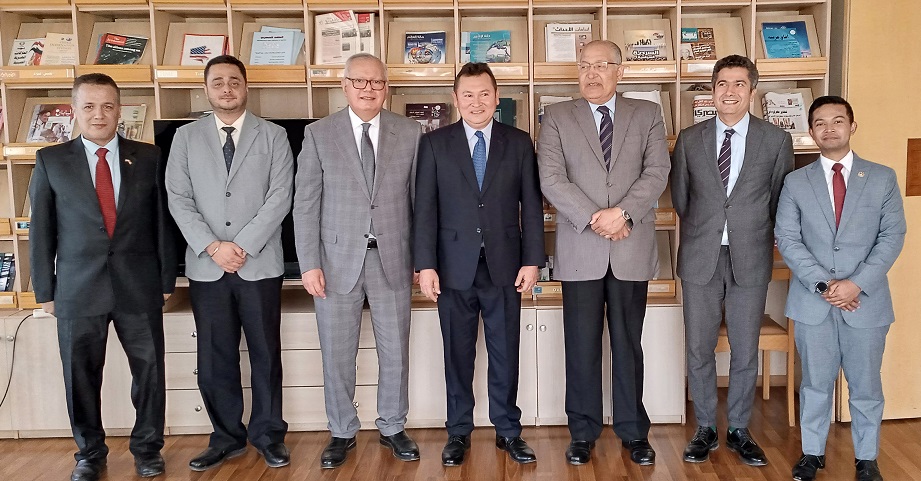Symposium on “The Trump Peace Plan”
February 11, 2020Arab media in the US…..Ambassador Hussein Hassouna, ,
February 22, 2020
The Council hosted on February 17, 2020, the Ambassador of Brazil to Cairo, Mr. Antonio de Aguiar Patriota, upon his request for a get to know meeting.
He mentioned that his country’s Minister of Foreign Affairs would come to visit Cairo on March 5, and he hopes to seize this opportunity to sign the Memorandum of Understanding between the Egyptian Council for Foreign Affairs and the “A Fundação Alexandre de Gusmão (The Alexandre de Gusmão Foundation (FUNAG))”, which has not yet been signed by our council:
-
I welcomed the signing of this memorandum, hoping that the Council would receive the Brazilian guest upon his visit to Egypt and complete the signing of the memorandum.
-
I asked the ambassador whether his country had fulfilled the promise of his country’s new president to move the Brazilian embassy in Israel from Tel Aviv to Jerusalem. The ambassador mentioned that the new Brazilian president was subjected to the influence of President Trump, but the pressure exerted by the Brazilians of Arab origin prevented him from fulfilling his promise. All what has happened was the opening of a private-sector business office in Jerusalem, and that office does not enjoy any official status or diplomatic immunities.
-
He inquired about the round table that had been hosted by our council in conjunction with the United Nations Institute for Disarmament Research (UNIDIR) on January 22, and its results. I informed him of what had taken place in preparation for the establishment of a zone free of all types of weapons of mass destruction in the Middle East. I pointed out that the meeting had touched upon the means of providing assurances of compliance with the new treaty, and I noted the importance of taking advantage of the experience of the five nuclear-weapon-free zones in the world, particularly the Treaty of Tlatelolco. I added that regarding the Middle East region, the situation is more complex, since the latter region needs to be free of all weapons of mass destruction and not just nuclear weapons. I personally believe that radiological weapons which are not yet subject to any treaty arrangements to ban them need to be added to nuclear, chemical and biological weapons.
-
As for compliance mechanisms, I have expressed my conviction that the compliance regime of the Chemical Weapons Convention (CWC) is the one to be used, particularly “The challenge-inspection system (CI)”.
-
I added that the round table also addressed the situation in the Indian Ocean island of Diego Garcia, which Mauritius claims as being an extension of its sovereignty, so as to be included in the Treaty of Pelindaba. But the United States and Britain objected to this, as the UK leased the U.S. this Indian Ocean island of Diego Garcia, which the U.S. use as a base on which it stores nuclear weapons, and it had already used it as a base to attack Iraq in 2003. The status of this island and its evacuation from weapons of mass destruction must be deliberated upon, if there is any serious intent to evacuate the Middle East from weapons of mass destruction, and also in the context of the denuclearization of the Southern Hemisphere; not to mention the nuclear states that are outside the NPT, which are, Israel, India, Pakistan and the Democratic People’s Republic of Korea (DPRK).
-
He asked why Egypt did not accede to the Treaty of Pelindaba. I explained that Egypt has signed it, but it was necessary to wait for the establishment of the Middle East zone free of weapons of mass destruction for Egypt to ratify it, where there is an overlap between the two regions. The ambassador inquired about other Arab African states that have not acceded to the treaty, so I referred to the case of Morocco, Sudan and Somalia, which, like Egypt, have signed the treaty but have not yet ratified it.






